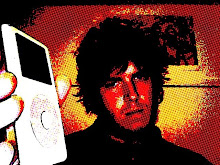What you're juuuust about to read is the first of a series of blogs on the future of music, as I see it. But more specifically, how it affects you and I as consumers of music. There are plenty of factors at play here, in regards to technology, and it seems to have everyone in a tizzy. (Did he just say 'tizzy'? I blame the schools.)
So, here's my take on the whole issue of downloading music. Be it legal or piracy, be it a problem for musicians or legal watchdogs, let's have a look at the future. Didja bring popcorn?
Conor Oberst (a.k.a. Bright Eyes) once lyricized, "The future hangs over our heads / and it moves with each current event..." So what's hanging over our heads right now? Nothing less than the future of music as a medium - that is, how we're going to get our grubby mitts on some new tunes. The current events moving this future along? The lines drawn, whether real or imaginary, between the music labels, the policing groups (notably the RIAA), and the consumers. We, the consumers, have been getting away with lots and lots of downloading without paying for the songs we're downloading. Napster had its heyday, and there's also been KaZaA, Limewire, and others with their turns in the limelight - ah. That is by no means meant to be a pun on the aforementioned downloading service... but I like it, now that it's there.
But with this freedom and expression of the Web 2.0 ideals of user-created interaction, comes legal repercussions from those who are saying, "Hey. Wait. That studio time cost us money, the mixing cost us money, and you know for damn sure that our manager takes a cut. Where's our money?!" The labels that front artists the funds aren't getting funds back. There's a bit of a gap in the nature of our economy. Granted, the RIAA lunging after consumers and nailing 15-year-olds with billion-dollar lawsuits seems like overkill, but I've not known watchdogs to be underwhelming.
The question we all have to ask ourselves is this: Just because we can get something for free, does that mean we should? I won't bother comparing this to cars or furniture or any other physical possessions, but it's worth asking yourself. If musicians are suspected of using someone else's music, they can and will be sued. It's not fair to allow one copy of an album become accessible to an unlimited sea of listeners who will then have no reason to buy said album. Simply put, if you want to hear a new album, buy the album.
So how do I feel about illegal downloading?
Here's how.
Cinnamon Roll Imperial Ale
6 years ago


I don't believe that people download illegally just because it's free anymore. That may have been the case in the early days of P2P networks. There are just too many ways to purchase music legally today.
ReplyDeleteI think Radiohead's "In Rainbows" proves that people are willing to pay for music, even though they can get them for free. That's not to say that it didn't end up on the torrents, but people did pay money for it.
It is however clear that the record labels didn't play nicely with their customers. In a free market economy, you can charge as much as people are willing to pay. People were essentially saying that they did not feel that the music was worth that much. Instead of working their business plan around the changing customer, they legislate their way around. While it's illegal to steal, it's one of those situations where following the letter of the law is better or worse.
For me, here's my analogy on downloading music illegally. It's like trying on clothes before I buy it. If it doesn't fit, I just hang it back on the rack. Instead, the RIAA wants you to just buy the clothes, and figure out if it fits when you get back home. But wait, there's no returns.
What I'm saying is, I'll download it illegally to see if I like the album, and if I like it, I'll pay for it. The chances of me buying an album increases.
I'll have to pull up the info I found when writing my paper for Writing last semester - but apparently people value a digital album at less than they would a physical CD... I want to say it's about $3.00 difference, but I'm not sure.
ReplyDeleteAnd my music prof told a story wherein a bunch of teenagers were asked to listen to samples of new music by record execs (to determine the "next big thing") and when all was said and done, they were encouraged to take free copies of the CDs with them. And no one did.
These are contrasting stories and I just realized that. The second one especially illustrates that no, people aren't downloading for free just because they can. But that is a decisive factor.
I think your analogy needs a little fine-tuning. Music is a physical and intellectual good - that is, you can purchase it, and if you play it, others in the room benefit. So it'd be more like taking a suit jacket home, trying it on, letting your friends try it on, and then saying you'll keep the jacket, but not the rest of the suit, thank you. Also, the shirt's free, right?